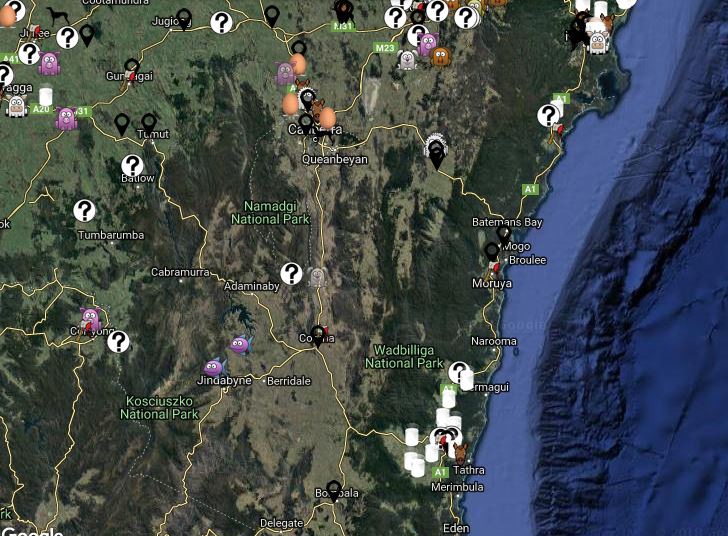
A local look at the Aussie Farms Map.
Farms across Southern New South Wales and the Australian Capital Territory have been listed on the animal rights-inspired ‘Aussie Farms Map‘, but those named are suggesting the listing is as good as defamation.
With links to Animal Liberation Australia, the Aussie Farms Map is said to be “a comprehensive, interactive map of factory farms, slaughterhouses and other animal exploitation facilities across Australia”.
Aussie Farms Repository who compiled and distributed the map say it is “an effort to force transparency on an industry dependent on secrecy.”
They ask readers: “If you find a facility that hasn’t been marked, you can login, right-click the facility on the map and choose to submit it for approval. You can also submit information about any facility already marked, and upload photos, videos and documents relating to that facility.”
There is very basic detail mentioned with each of the 80 odd listings between Bombala, Bega, Mogo, Milton, Goulburn, Braidwood, Yass, and Canberra.
The enterprises listed take in dairy, pig, chicken, and trout farms as well as sale yards, zoos and horse racing stables, and include the National Zoo and Aquarium and Thoroughbred Park in Canberra, the Yass Livestock Exchange Saleyards, Bindaree Bee Supplies at Murrumbateman, and Mogo Zoo in the Eurobodalla.
As far as Region Media can tell, the map makes no specific allegations of animal cruelty against any of the locals listed.
It would seem that they have all been accused of animal exploitation simply because of their commercial relationship with animals.
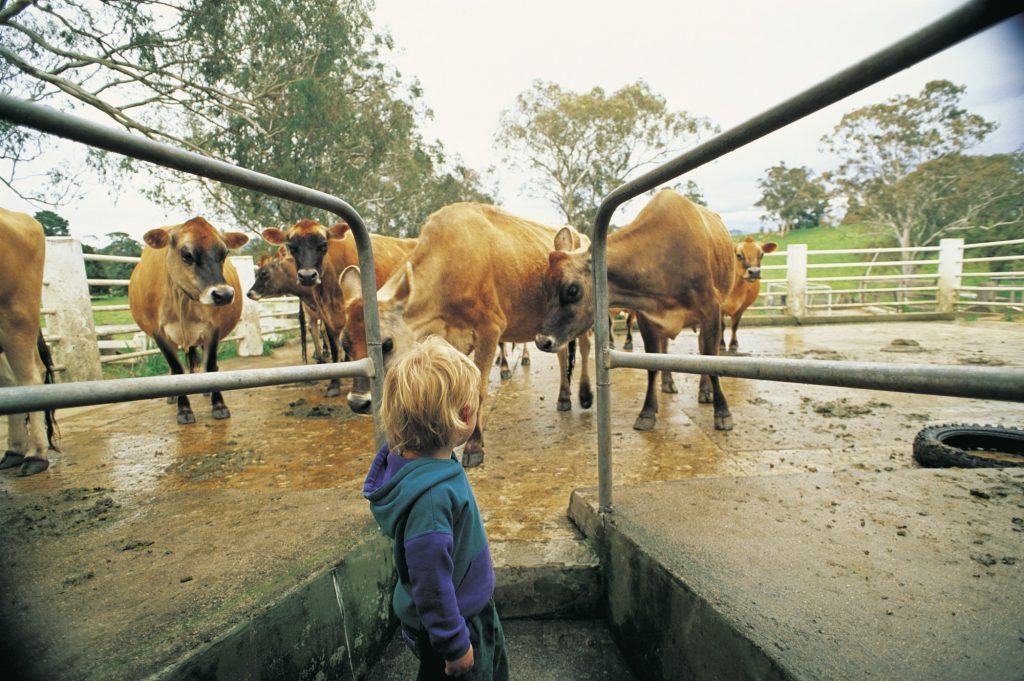
The Bega Valley has a rich dairy history and is the home of Bega Cheese. Photo: Sapphire Coast Tourism.
“It’s a defamation case really,” says Graeme Afflick of Afflick Meats at Moruya.
“They have put us on this map and we have done nothing wrong.”
The Afflick abattoir has been in operation for over 60 years and currently “kills” once a week supplying a couple of local butchers while also selling meat direct to the public from the facilities bonning room.
“We try and treat our product the same way we treat humans, we don’t use prodders, we make sure they have water and feed and always looking out for the general wellbeing of the animal.”
Karen Howells, owner of Eucumbene Trout Farm near Jindabyne, says she is upset at being tarred with animal cruelty.
“I invite these people to come and have a look,” Mrs Howells says.
“We really believe in pond-to-plate and animals being well cared for. We don’t overstock our ponds, we keep them clean, we don’t allow a fish to be returned to the water after it’s caught because they are unlikely to survive – we dispatch them immediately.”
The Howells’ business caters for tourists who came to fish in one of the property’s fish ponds. Each pond is roughly the size of a 50-metre swimming pool and contains between 400 to 500 Rainbow Trout. Visitors mostly cook the fish they catch on one of the farm’s barbeques for lunch or dinner.
“Listing us on the map, when they haven’t even spoken to us about what their aims are, makes me uncomfortable,” Mrs Howells says.
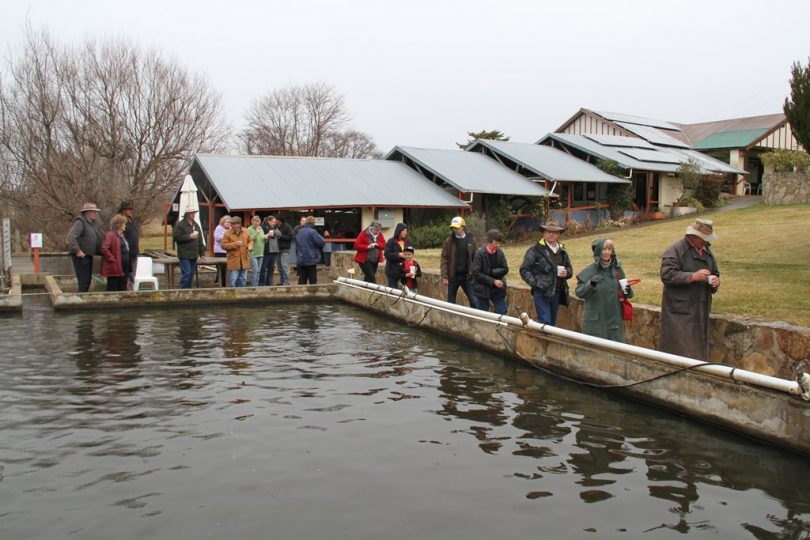
Eucumbene Trout Farm. Photo: Eucumbene Trout Farm website.
The Russell family have farmed the fertile floodplains of the Bega River at Jellat Jellat for decades. Robert and his family are one of a number of Bega Cheese suppliers listed on the Aussie Farms Map.
“If you are vegan or against animal products you are entitled to that view, but I don’t think you should be telling other people that what we do is the wrong thing,” Mr Russell says.
“No one likes to see animals suffering and if your animals are suffering then you are not doing your job. And your business suffers, your animals need to be healthy to get the best produce from them.”
Phil Ryan milks about 200 cows each day at Bega. He isn’t listed on the map but is angry for others in the area who are. He describes the map as “hate speech”.
“I think this movement is very misguided, there is a lot of room for misunderstanding between people who think they are doing the right thing and farmers who are doing the right thing – the concept that we don’t care for our animals is greatly offensive,” he says.
Mr Ryan is concerned about the biosecurity risk to his industry, with the Aussie Farms Repository encouraging people to add more farms and more detail to the map including photos and video.
“If you are a farmer on this map I’d be suggesting you install cameras and other security devices, which really shouldn’t be necessary.”
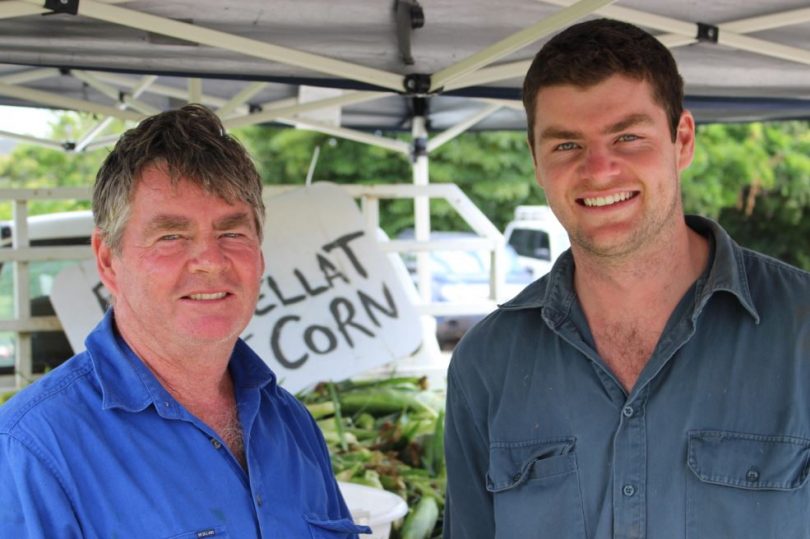
Robert and Will Russell. Photo: Ian Campbell.
National Farmers’ Federation (NFF) President Fiona Simson agrees. “They [farmers] are extremely anxious and very angry that their workplace, and their home, has become the target of extreme and dangerous activities.”
“Almost every day, we’re seeing examples of activists accessing farms and businesses without permission, seeking to disrupt the work our farmers do.
“These types of stunts risk human and animal wellbeing and are deeply offensive.
“The presence of unapproved people in farm environments has the potential to spread bacteria and disease which could impact the whole food chain, not to mention the trade implications.”
The NFF is seeking legal advice on the implied link the map makes that the farmers represented are involved in animal cruelty and any potential infringement of privacy and trespass laws.
Ms Simpson also suggests that the map should be taken down and that Aussie Farms‘ charitable status be retracted by the Australian Charities and Not-for-Profits Commission.
Member for Eden-Monaro, Dr Mike Kelly says he is deeply concerned about the group’s approach.
“I understand that some of the people involved in this project probably have good intentions, but the road to hell is paved with good intentions,” Dr Kelly says.
“These people are setting themselves up as judge, jury and executioner.
“In the current drought, these farmers deserve our support not to be highlighted in this way.
“We have regulatory organisations that deal with animal cruelty issues, citizens should not be taking matters into their own hands. I condemn this kind of vigilantism. If you have a concern, raise it with the appropriate authorities,” Dr Kelly says.
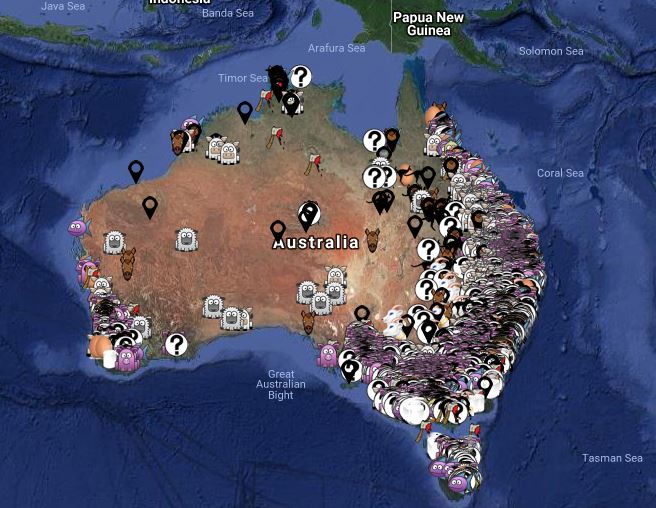
A national overview of the Aussie Farms Map.
Late today, Federal Agricultural Minister David Littleproud described the map as an “attack list” for activists.
He told the ABC that he has asked Aussie Farms Repository to take the website down.
“I’m not holding any hope that we, as a Federal Government, can stop them, but they should do it themselves,” he said.
“Initial advice is that it is within the law – unless an individual farmer wishes to take action.”
Mr Littleproud told the ABC that the group needed to use its “moral compass”.







